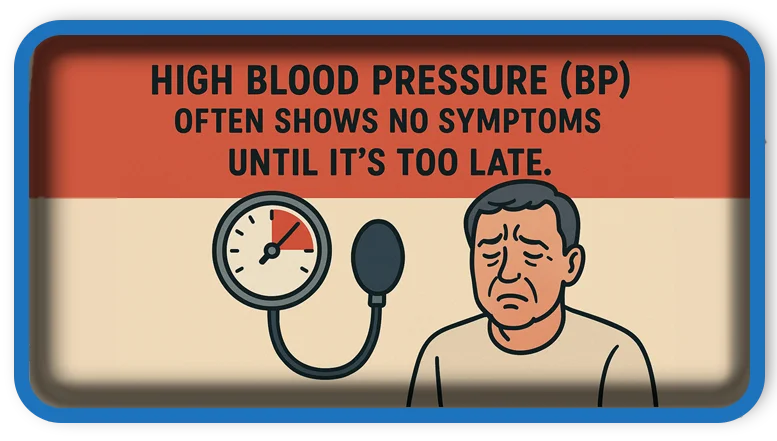⏲️ Estimated reading time: 5 min
Warning Signs Your Blood Pressure Is High
High blood pressure (BP) often shows no symptoms until it’s too late. Learn about the subtle and severe warning signs of hypertension, what causes it, and how to take control of your heart health before it leads to serious complications.
Warning Signs Your Blood Pressure Is High

High BP, or hypertension, is one of the most dangerous health conditions affecting people worldwide. It’s often referred to as the “silent killer” because many individuals don’t even realize they have it until major health complications occur like a stroke or heart attack.
In this post, we’ll dive deep into what high BP is, the early and late-stage warning signs, and how to monitor and manage it effectively.
What Is High Blood Pressure?

Blood pressure is the force exerted by your blood against the walls of your arteries as your heart pumps it throughout your body. When that pressure remains too high for too long, it damages your blood vessels and vital organs.
Normal blood pressure:
- Systolic: under 120 mm Hg
- Diastolic: under 80 mm Hg
High blood pressure (hypertension):
- Systolic: 130 mm Hg or higher
- Diastolic: 80 mm Hg or higher
Why High Blood Pressure Is Dangerous
If untreated, hypertension can lead to:
- Heart disease
- Stroke
- Kidney failure
- Vision loss
- Cognitive decline
Because of its silent nature, it’s crucial to recognize the warning signs that may indicate your BP is dangerously elevated.
1. Persistent Headaches

While occasional headaches are normal, frequent and severe headaches, especially in the morning, can be a sign of high BP. This happens due to increased pressure on blood vessels in the brain.
2. Dizziness or Feeling Faint

Feeling lightheaded or faint might indicate irregular blood flow or that your heart is under stress. Though dizziness can result from many causes, when combined with other symptoms, it could point to hypertension.
3. Blurred or Distorted Vision

High BP can damage the tiny blood vessels in your eyes. Known as hypertensive retinopathy, this condition can lead to blurry vision, double vision, or even sudden vision loss in extreme cases.
4. Chest Pain or Pressure

Chest pain can indicate that your heart is struggling to pump blood efficiently. This could be due to high BP causing your heart to work harder, potentially leading to heart failure or heart attack.
5. Shortness of Breath
When your heart is overworked or your arteries are narrowed, it can make breathing difficult. Shortness of breath especially while resting or lying down should never be ignored.
6. Irregular Heartbeat (Palpitations)

A racing or irregular heartbeat may signal that high blood pressure is affecting your heart’s rhythm. Left untreated, it can evolve into dangerous arrhythmias or heart failure.
7. Nosebleeds
Although not always linked to high BP , sudden and frequent nosebleeds especially when paired with other symptoms can be a warning sign of a hypertensive crisis.
8. Fatigue and Confusion

When blood flow to the brain is reduced due to high BP, you may feel unusually tired or confused. These symptoms can also appear just before a stroke.
9. Blood in the Urine

Kidneys are extremely sensitive to changes in BP. If they’re damaged, it can result in visible or microscopic blood in the urine a very serious sign that your blood pressure is too high.
10. Pounding in Chest, Neck, or Ears
Some people experience a sensation of pounding or pulsing in these areas when blood_pressure is high. This can be disorienting and may feel like a rapid heartbeat or thumping.
When to Seek Emergency Help
You should seek immediate medical care if you experience any of the following with suspected high BP:
- Chest pain
- Difficulty breathing
- Sudden vision loss
- Weakness or numbness on one side
- Slurred speech
- Confusion
These may be signs of a hypertensive emergency, stroke, or heart attack.
Causes and Risk Factors for High Blood Pressure

Common risk factors include:
- Poor diet (especially high sodium intake)
- Lack of physical activity
- Smoking and alcohol use
- Stress
- Obesity
- Age and family history
- Chronic kidney disease
How to Check Your Blood Pressure at Home

Regular monitoring is key. Use a digital BP monitor, and follow these tips:
- Sit calmly for 5 minutes before checking
- Keep arm supported at heart level
- Take readings at the same time daily
- Track readings in a log or app
Managing High Blood Pressure
Lifestyle changes can significantly reduce BP levels:
- Eat a heart-healthy diet (low sodium, DASH diet)
- Exercise regularly (30 min/day, 5x/week)
- Maintain a healthy weight
- Quit smoking
- Reduce alcohol
- Manage stress (meditation, therapy, sleep)
- Take prescribed medication consistently
Final Thoughts

High blood pressure doesn’t always come with loud symptoms but when it does, your body is trying to warn you. By knowing what to look for and acting early, you can take back control of your health and avoid life-altering consequences.
If you or someone you love is experiencing any of these warning signs, don’t delay check your blood pressure today and speak to a healthcare professional.
Don’t forget to like, share, and comment below if you found this article helpful. Stay healthy and aware!
🏷️ Tags: high blood pressure, hypertension symptoms, warning signs, heart health, blood pressure tips, healthy lifestyle, stroke prevention, medical symptoms, wellness guide, cardiovascular health
Only logged-in users can submit reports.
Discover more from HelpZone
Subscribe to get the latest posts sent to your email.

